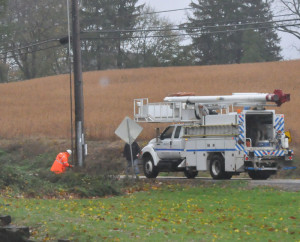Schools, government offices reopen; life slowly returning to normal

PECO repair crews at work, Tuesday in Pocopson, working to restore power in the wake of Hurricane Sandy.
Updated: 3:10 p.m.
Slowly, Chester County is returning to normal in the wake of Hurricane Sandy. While the county got off fairly easily compared with parts of New Jersey and New York City, cleanup crews continue to work to remove downed trees and power lines as life started to return to normal for most area residents.
Some 30,000 homes remain without power in the county (another 30,000 are without power in Delaware County) according to PECO — and a total 400,000 homes and businesses in southeastern Pennsylvania were without power as of Wednesday morning. That’s down from a high of 800,000 homes and businesses — roughly half of PECO’s service base of 1.6 million customers.
The power outages remain much worse in Bucks and Montgomery County and the company is moving most of its repair assets to those counties, where each still has more than 100,000 homes without power as of Wednesday morning.
Power outages appears to be the biggest remaining issue from the storm, which appears to do less damage than initially feared, but still took down trees, flooded local creeks and caused localized damage. Coatesville came out the storm in pretty solid shape, City Manager Kirby Hudson said. He noted he that he had been worried about tree fall in some of the city’s residential sections, but downed trees were fairly rare in the city, he said, Wednesday.
A handful of roadways remain closed in the area, as crews work to remove trees and downed wires. Much, if not all, of the flooding issues in the area seem to have abated.
Schools have reopened as have most municipal offices in the county. Chester County offices reopened this morning.
Gov. Tom Corbett extended the deadline for applying for an absentee ballot for next week’s election — the deadline has been moved back one day for each day county offices were closed. Because of that ballot applications will be accepted through 5 p.m., Thursday Nov. 1. All voted ballots must be in the office — the Westtown Voter Services office — by Friday, Nov. 2 by 5 p.m.
The state Department of Health issued suggestions for those coping with issues following the storm, Wednesday:
“It has been very difficult for all of us to experience or witness the devastation that Hurricane Sandy brought to parts of Pennsylvania and surrounding areas,” said Acting Health Secretary Michael Wolf. “While preparing for Sandy was vital, it’s equally important to take steps now to keep yourself and your loved ones healthy after the storm.”
Wolf said that Pennsylvania has a wealth of resources available to help everyone in need, but that there are also a number of common sense approaches Pennsylvanians can take to help ensure their continued safety. He provided the following information and tips:
· Prevent carbon monoxide poisoning:
· If your power is out, you may try to power your home by using generators or camp stoves, which can release carbon monoxide. Carbon monoxide is an odorless, colorless gas that is released from many types of equipment, builds up in closed spaces, and is poisonous to breathe. Leave your home immediately and call 9-1-1 if your carbon monoxide detector sounds. Get medical help right away if you are dizzy, light headed or nauseous.
· Keep as warm as possible when your power is out:
· Hypothermia is a serious condition that happens when your body temperature is too low. This usually happens in very cold weather, but can also happen when exposed to temperatures of 40 degrees or higher. Those most at risk include older Pennsylvanians and babies sleeping in cold rooms. If your power is out for a long time, stay with a relative or friend, or go to an emergency shelter.
· Prevent electrical injuries:
· Hurricane Sandy left dangerous power lines on the ground when it moved through Pennsylvania. Never touch a fallen power line or drive through standing water if power lines are in the water. Electrical wires on the ground may be “live” and could hurt or kill you. Avoid contact with overhead power lines while cleaning up after the storm and call the power company to report any fallen power lines.
· Make sure food and water are safe:
· Food – When in doubt, throw it out! If electricity in your home has been off for long periods of time, throw away foods that can spoil (like meat, poultry, fish, eggs, leftovers, etc.)
· Water – If your tap water is unsafe to drink, local authorities may issue “boil water advisories”. Follow boil water advisories exactly to make sure tap water is safe before you drink or use it. If you cannot boil the water, use bottled water instead.
· Prevent unhealthy mold growth after flooding:
· Clean up and dry out flooded buildings within 24 to 48 hours if possible. To prevent mold growth, clean wet items and surfaces with detergent and water. Everything that floodwater has touched should be disinfected with a solution of one cup of bleach in one gallon of water.
For more information about staying safe after Hurricane Sandy, visit www.health.state.pa.us and choose “Click Here for Hurricane Sandy Updates” at the top of the page. You can also visit www.pa.gov for more information and helpful resources.






